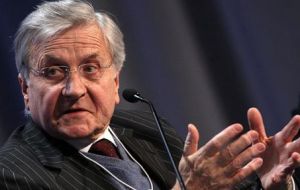MercoPress. South Atlantic News Agency
Trichet: don’t blame the Euro; it’s a solid currency in historical terms
 European Central Bank president Jean Claude Trichet
European Central Bank president Jean Claude Trichet European Central Bank President Jean-Claude Trichet Monday sought to reassure investors on the resilience of the Euro-zone as Ireland's formal request for financial assistance from the bloc sparked nervousness on European credit markets.
“The Euro as a currency has remained stable in a remarkable way. It's a solid currency in historical terms” said Trichet speaking before the European Parliament in Strasbourg. He added European politicians should refrain from the temptation of using the single currency as a scapegoat for current difficulties.
Over the weekend the Irish government formally applied for tens of billions of Euros in aid from the European Union and the IMF. However the money will be forthcoming, pending negotiations on details of Irish debt restructure and cuts in budget deficit.
But news of the aid package failed to bolster the European single currency, which gave up most of its gains at the end of the European trading session on fears that other EU deficit-ridden countries such as Portugal might have to request financial help.
Although he didn't comment directly on Ireland, Trichet said the bloc's current problems shouldn't overshadow benefits brought by the single currencies to its members since its inception, citing price stability in particular.
EU commissioner for Economic and Monetary Affairs Olli Rehn, also speaking in front of the European Parliament, noted the single currency is in line with its long-term average in real effective terms, and stressed its drop by the same measurement is limited to 7% since the beginning of the year.
But Rehn made it clear Europe had to offer financial aid to Ireland to stop damage from spreading further and undermining the stability of the Euro-zone. “Providing assistance to Ireland is warranted to preserve Euro-zone stability,” Rehn said. He added talks between Ireland, the EU and the IMF on the aid package should be completed by the end of the month.
“Any talk of deconstruction of the European project is irresponsible...the Euro is the cornerstone of the European Union's core political project” Rehn told European lawmakers. Trichet said the Euro-zone needs “very strong fiscal surveillance” to prevent future crises and reiterated earlier criticism that recent proposals by the EU Council to strengthen economic governance in the region and impose tougher sanctions on countries in breach of the Euro-zone's Growth and Stability pact didn't go far enough.
He said Europe alone isn't to blame for the public finances crisis rattling markets. He pointed his finger at other deficit countries such as the U.S. and Japan, noting the Euro-zone as a whole is in a better fiscal position than they are.
“This is not a European crisis but the repercussion in Europe of a global crisis... The U.S. and Japan also have problems of first magnitude,” Trichet said. “It's bad fiscal behavior in a number of countries which has created problems.”




Top Comments
Disclaimer & comment rules-

Read all commentsYeah. About as solid as custard.
Nov 23rd, 2010 - 06:05 pm 0Commenting for this story is now closed.
If you have a Facebook account, become a fan and comment on our Facebook Page!